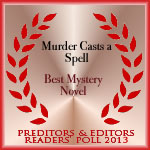 Characters make your story. Your novel comes to life when your characters come to life. Your main characters are important, but don’t forget your minor characters. You won’t spend as much time and story space on them, but the sentence you write about them must make them stick in your reader’s mind. Here are some strategies that help reveal characters.
Characters make your story. Your novel comes to life when your characters come to life. Your main characters are important, but don’t forget your minor characters. You won’t spend as much time and story space on them, but the sentence you write about them must make them stick in your reader’s mind. Here are some strategies that help reveal characters.
•Mannerisms, those little gestures and movements that set people apart are important character builders. Consider body language such as facial expressions—smiles, frowns, scowls, direct eye contact; gestures such as fidgeting or covering the mouth or blinking; other behaviors such as a firm handshake, leaning forward with interest, or rigidly crossed arms.
•You can reveal information about a character and his personality through that character’s thoughts, words, and actions.
•A person’s history and upbringing play a large part in forming his personality. This is the back story. Where does your character come from? What are the joyful and painful experiences life has dealt him? These are the elements that have formed her values and attitudes. Interweave the character’s history into the plot in small portions throughout the story.
•Use characters’ perceptions of other characters. Two characters may describe the same story person differently: A sister may see her brother as lovable. A brother may see him as dependable. A colleague values the same man because of his insight. A lover despises him for another reason.
•Give your character flaws: throat clearing, loud laughter, obsessive about time, cleanliness, food, insecure, afraid of the dark, frizzy hair, workaholic, nail biter.
•Dialogue can show character mood, perspective, political views, fears, prejudices, or his belief system
•Show physical traits through action: Susan powdered her freckled nose then ran a comb through her curly blonde hair. When John rose from the chair, his head nearly touched the low ceiling.
•Make your characters memorable by giving them labels. For example, that pushy woman, that blustery guy, that gourmet cook, that pudgy little boy.
Use these strategies to avoid tedious descriptive passages that slow the pace of story action.











Excellent points and put in a succinct bullet list makes them easier to keep track of too. Thanks.
LikeLike
By: deepercolors on July 12, 2010
at 8:07 pm
Your posts on writing are excellent, NancyCurteman. Thank you so much for producing such a handy reference.
LikeLike
By: Loreen Lee on July 13, 2010
at 1:54 am
Good things to remember – I often struggle with making minor characters rounded and real without weighing them down. Thanks for the list!
LikeLike
By: tsuchigari on July 13, 2010
at 11:11 am
Minor characters can really spark a novel. A little effort to make them memorable will really pay big dividends.
LikeLike
By: nancycurteman on July 13, 2010
at 7:48 pm
{{Clears throat, pushes frizzy hair away from face with left hand, while nibbling nails on the right hand}}
{{CLEARS THROAT AGAIN}}
“. . . Loud laughter is NOT a character flaw.”
{{Looks around the room, insecurely, to see if anyone agrees before whispering}}
“. . . it is a possession to be treasured.”
Loud laughter erupts across the room!!!
Great post!
LikeLike
By: nrhatch on July 14, 2010
at 1:06 pm
[…] Developing Characters is No Mystery […]
LikeLike
By: How Do Conflict and Crisis Differ in a Mystery Novel? « Global Mysteries on August 14, 2010
at 4:57 pm
[…] A Critical Element in the Mystery Novel What is Literary Style? What is Theme in Literature? Developing Characters is No Mystery Author’s Voice: How to […]
LikeLike
By: How Important is Conflict in a Mystery Story? « Global Mysteries on August 14, 2010
at 5:13 pm
[…] A Critical Element in the Mystery Novel What is Literary Style? What is Theme in Literature? Developing Characters is No Mystery Author’s Voice: How to find it? Possibly related posts: (automatically generated)Developing […]
LikeLike
By: How to Create Minor Characters in Your Mystery Novel « Global Mysteries on August 14, 2010
at 5:16 pm
[…] is Literary Style? What is Theme in Literature? Developing Characters is No Mystery Author’s Voice: How to find it? Possibly related posts: (automatically generated)Setting: Know […]
LikeLike
By: Pacing: A Critical Element in the Mystery Novel « Global Mysteries on August 14, 2010
at 5:19 pm
[…] is Theme in Literature? Developing Characters is No Mystery Author’s Voice: How to find it? Possibly related posts: (automatically generated)3 Must Read […]
LikeLike
By: What is Literary Style? « Global Mysteries on August 14, 2010
at 5:22 pm
[…] Top Posts How Do Conflict and Crisis Differ in a Mystery Novel?Five Must-Read European Mystery WritersThe Oldest Square in ParisCape Town's District Six3 Outstanding Character-Driven Mystery AuthorsHow Important is Conflict in a Mystery Story?Ned Kelly: The Australian Robin HoodWhat is Theme in Literature?The Guillotine, A Humane Execution MachineDeveloping Characters is No Mystery […]
LikeLike
By: What is Theme in Literature? « Global Mysteries on August 14, 2010
at 5:29 pm
[…] 7 Characteristics of Today’s Modern Mystery Novels Posted by: nancycurteman on July 14, 2010 Developing Characters is No Mystery Posted by: nancycurteman on July 12, 2010 Author’s Voice: How to find it? Posted […]
LikeLike
By: 4 Do’s and Don’ts of “Show, Don’t Tell” « Global Mysteries on August 15, 2010
at 12:53 pm
[…] That Will Challenge The Cleverest Sleuth 7 Characteristics of Today’s Modern Mystery Novels Developing Characters is No Mystery Author’s Voice: How to […]
LikeLike
By: 9 Ways to Create Tension in a Mystery Novel « Global Mysteries on August 18, 2010
at 8:29 pm
[…] That Will Challenge The Cleverest Sleuth 7 Characteristics of Today’s Modern Mystery Novels Developing Characters is No Mystery Author’s Voice: How to […]
LikeLike
By: What is Story Structure? « Global Mysteries on August 21, 2010
at 3:03 pm
[…] That Will Challenge The Cleverest Sleuth 7 Characteristics of Today’s Modern Mystery Novels Developing Characters is No Mystery Author’s Voice: How to […]
LikeLike
By: How to Create Sympathetic Mystery Novel Character « Global Mysteries on August 23, 2010
at 8:23 pm
[…] That Will Challenge The Cleverest Sleuth 7 Characteristics of Today’s Modern Mystery Novels Developing Characters is No Mystery Author’s Voice: How to find it? What is Story Structure? 9 Ways to Create Tension in a Mystery […]
LikeLike
By: How to Write Character Arc in a Mystery Novel? « Global Mysteries on August 26, 2010
at 9:08 pm
[…] That Will Challenge The Cleverest Sleuth 7 Characteristics of Today’s Modern Mystery Novels Developing Characters is No Mystery Author’s Voice: How to find it? What is Story […]
LikeLike
By: How to Edit a Mystery Novel « Global Mysteries on August 31, 2010
at 11:43 am
[…] That Will Challenge The Cleverest Sleuth 7 Characteristics of Today’s Modern Mystery Novels Developing Characters is No Mystery Author’s Voice: How to find it? What is Story […]
LikeLike
By: Global Mysteries on October 7, 2010
at 4:04 pm
[…] That Will Challenge The Cleverest Sleuth 7 Characteristics of Today’s Modern Mystery Novels Developing Characters is No Mystery Author’s Voice: How to find it? What is Story […]
LikeLike
By: 6 Ways to Avoid “Information Dumps” in a Mystery Novel « Global Mysteries on October 11, 2010
at 7:57 pm
[…] That Will Challenge The Cleverest Sleuth 7 Characteristics of Today’s Modern Mystery Novels Developing Characters is No Mystery Author’s Voice: How to find it? What is Story […]
LikeLike
By: How to Write a Mystery Novel Synopsis « Global Mysteries on October 28, 2010
at 4:23 pm
[…] 7 Murder Weapons That Will Challenge The Cleverest Sleuth How Do Conflict and Crisis Differ in a Mystery Novel? How Important is Conflict in a Mystery Story? Developing Characters is No Mystery […]
LikeLike
By: Alibis and Motives Make or Break a Mystery Novel « Global Mysteries on December 16, 2010
at 4:23 pm
[…] Writing Tips: Developing Characters is No Mystery How to Create Minor Characters in Your Mystery Novel The Romantic Heroine in a Mystery Novel How […]
LikeLike
By: How to Make a Mystery Novel Victim More Than Just a Dead Body Body « Global Mysteries on January 3, 2011
at 2:58 pm
[…] That Will Challenge The Cleverest Sleuth 7 Characteristics of Today’s Modern Mystery Novels Developing Characters is No Mystery Author’s Voice: How to find it? What is Story […]
LikeLike
By: 10 Tips For Writing Backstory in a Mystery Novel « Global Mysteries on January 9, 2011
at 9:29 pm
[…] Developing Characters is No Mystery How to Create Minor Characters in Your Mystery Novel […]
LikeLike
By: How a Partner Sleuth Will Spice up Your Mystery Novel « Global Mysteries on January 11, 2011
at 2:32 pm
[…] How to Create Sympathetic Mystery Novel Characters How to Create Minor Characters in Your Mystery Novel The Romantic Heroine in a Mystery Novel Developing Characters is No Mystery […]
LikeLike
By: How Subplots Enrich You Mystery Novel « Global Mysteries on March 18, 2011
at 3:43 pm
thank you for the interesting and helpful info.
LikeLike
By: magic quill on May 11, 2011
at 2:08 pm
Wonderful list.
LikeLike
By: deepercolors on May 29, 2011
at 9:27 pm